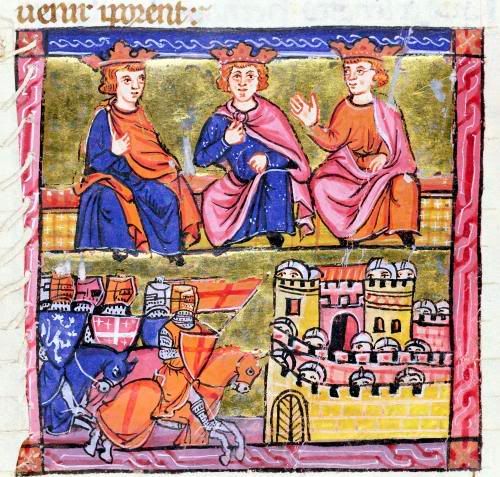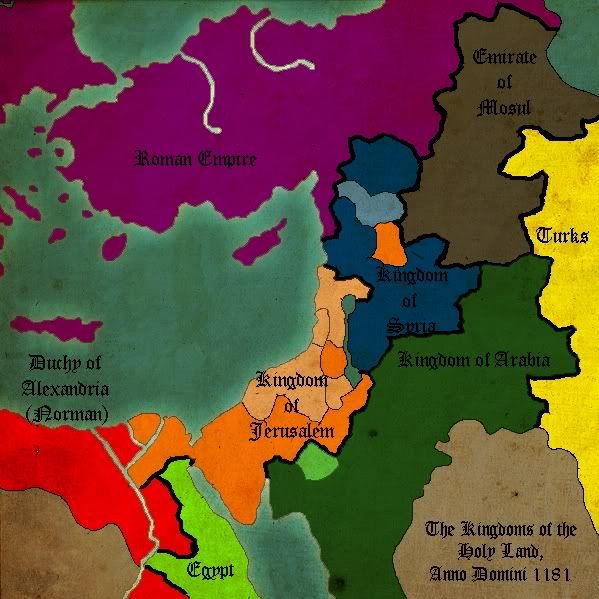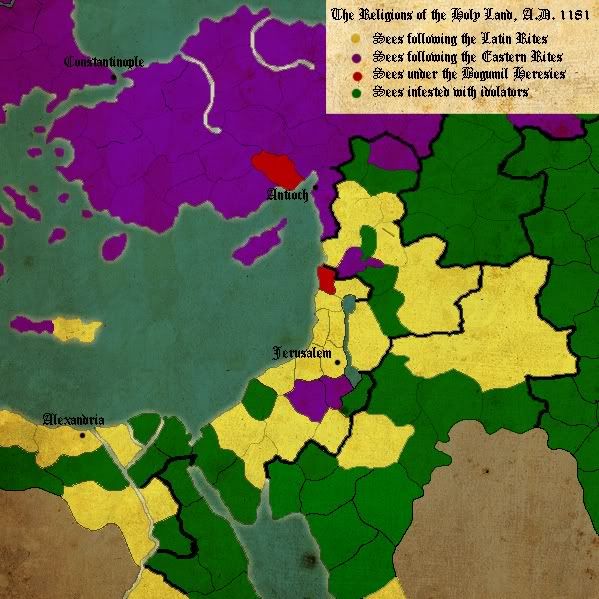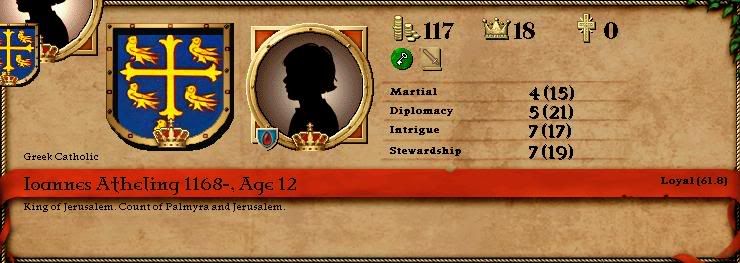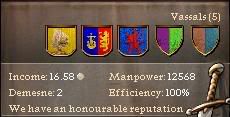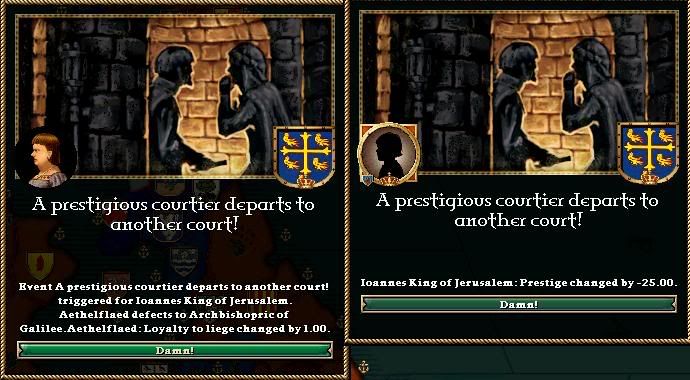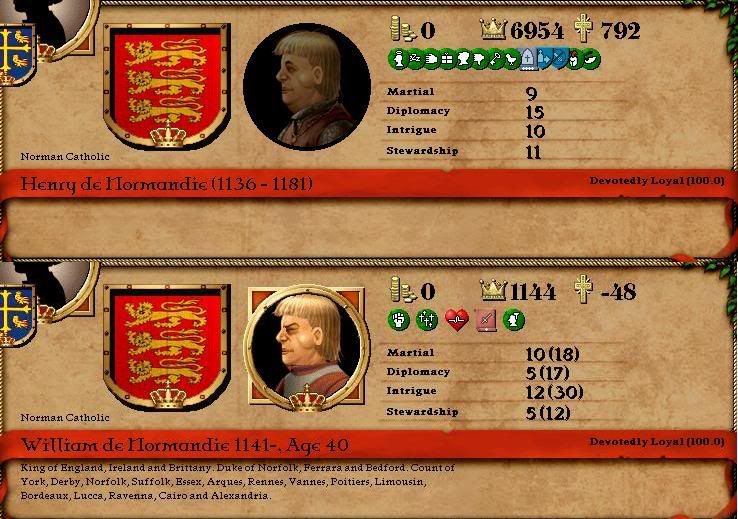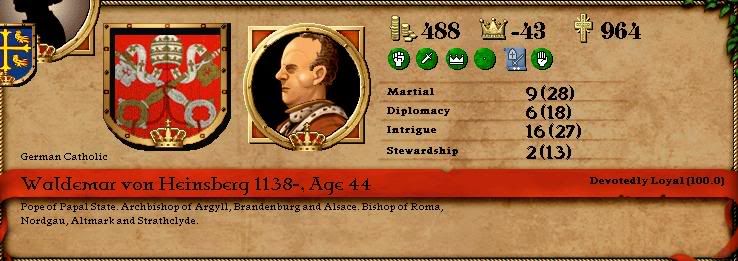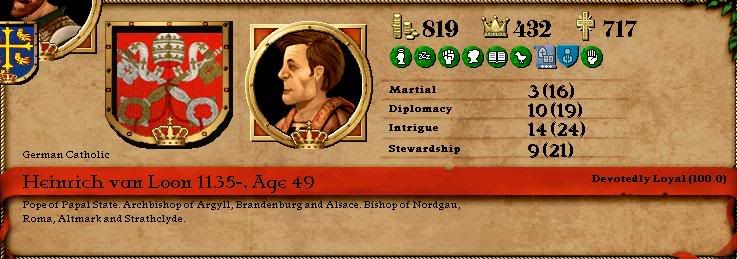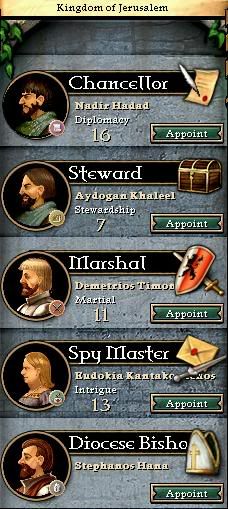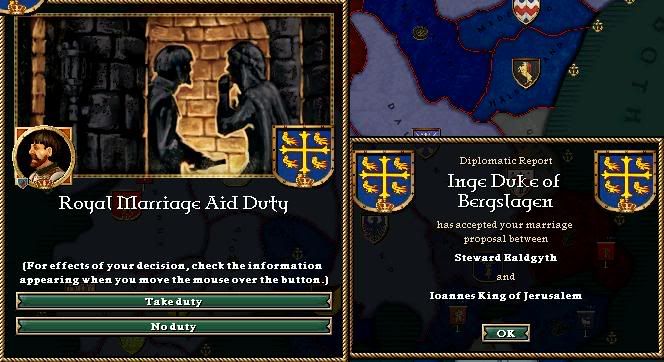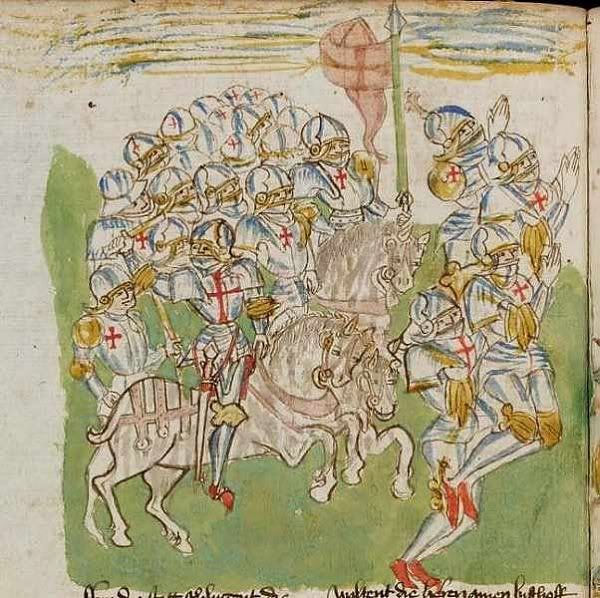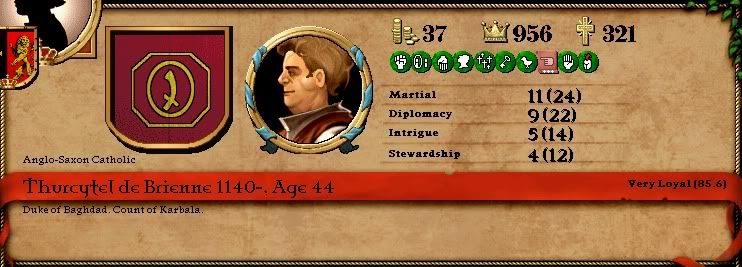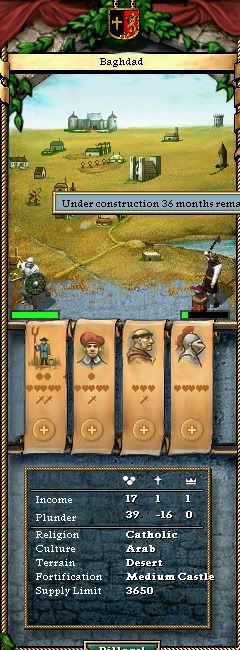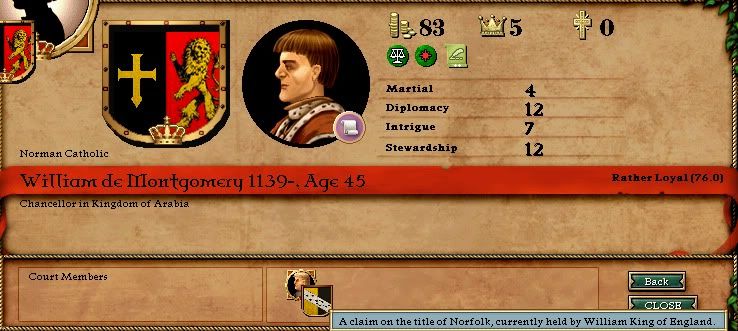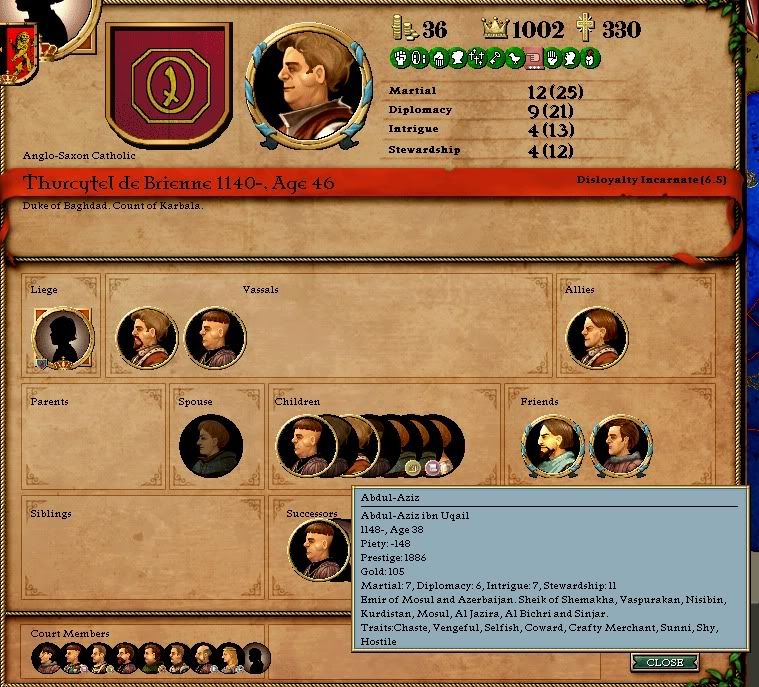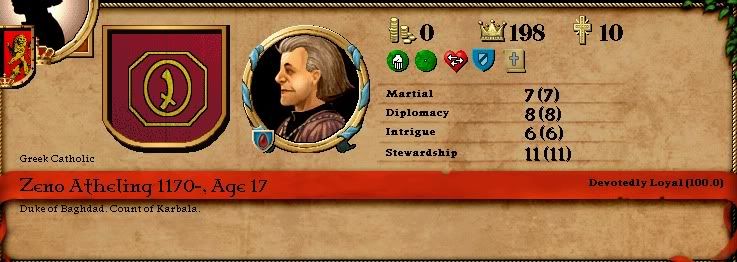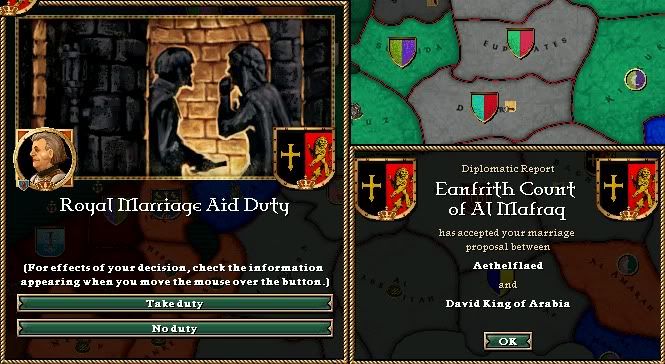Chapter 52 – The Reign of John I, part 1
Chapter 52 – The Reign of John I, part 1
The Affairs of the Jerusalem Witan, 1181 - 4
From Wilfred of Acre’s Tripartite History
The New Order
I have recorded the way in which the Christmas Witan of 1180 resulted in the fracture of the Kingdom of the English into three parts, each governed by a local witan, and each presided over by a son of King Theodorus. Now, the division of the Kingdom ran as follows. Under the Jerusalem Witan were the following areas: the Duchy of Jordan, the Duchy of Jaffa, the Duchy of the Sinai, the Bishopric of Beirut, as well as the Earldoms of the Delta and the Earldom of Pelusia in Egypt. The cities of Hebron and Acre were regarded by the Witan as being under their authority also, though in reality the Knights of St John and the Knights of the Temple governed them as their own. Under the Syrian Witan were the following areas: the Duchy of Edessa, the Duchy of Aleppo, the Duchy of Tripoli, the Duchy of Damascus and the Duchy of Syria. Under the Arabian Witan were the following areas: the Bishopric of Medina, the Duchy of Petra, the Duchy of Arabia and the Duchy of Baghdad.
After the death of King Theodorus, all the earls of the kingdom were therefore clear and steadfast in their duty, and there was no need to call together the Witan to elect a king, as was customary in this situation. Instead, each of the sons of Theodorus were borne from Jerusalem to Bethlehem, and anointed together by Archbishop Stephan. Prince John, as the eldest was proclaimed as King of the English in Jerusalem, just as his father, grandfather and great-grandfather had been before him. Prince David, as the next eldest, was anointed as King of the English in Arabia, and Prince Romanus, the youngest of the King’s sons, was anointed as King of the English in Syria. In this way the Kingdom was whole and yet divided. Like the Father, Son and Holy Ghost, the Kingdom of the English was of one substance, one mind, and indivisible despite its three aspects.
Now, King John, as the eldest of the brothers, held the senior position within the trinity and, at least in theory, could summon the Grand Witan of all the earls if a major decision needed to be made. But for the everyday activities of his inheritance, his affairs were directed only by the earls present within the Jerusalem Witan. At the time of the coronation, there was a clear discrepancy in the earls present to make homage unto the Kings. Ølver Morcarson, son of the infamous traitor of King Theodorus’ reign was absent at the occasion, as was the Bishop of Beirut, whose status under the law was yet to be resolved. The Holy Father Anastasius had previously granted the diocese autonomy from the crown, and the new incumbent of the see showed no desire to change this situation. Because of these two detractions, the territory under the authority of King John was much diminished from what it should have been, and the most valuable sea-ports of the Levant, at Jaffa, Acre, Tyre and Beirut, paid no dues to the treasury.
The Old Guard are Pushed into Retirement
The other consequence of the absence of these powerful men from the Jerusalem Witan was that the power rested almost entirely within the hands of Duke Edmund of Jordan. In effect, it was he who acted as regent for the young king in these first few years. The Lady Godfigu, so long a powerful figure in the court, saw her influence wane in this time, as Duke Edmund sought to undermine her by promoting Greeks and local notables to positions of authority. In particular, several Arabs and Turks who had been baptised in the faith were, at this time, entrusted with powerful positions. Indeed, although the Lady resisted this transfer of authority, she was without allies, and her attempts were futile. This caused her much distress, and before long her mind, it seemed, grew weak with the frustration at her situation, and what advice she did offer was often incoherent or possessed of little sense.
The priority of the Duke and his advisors was not only to control the young King completely, but also to recover those lands lost by the King’s father, most notably in Galilee and Jaffa. The first progress towards this goal was made early in the spring of the first year of the King’s reign, when representatives from the island of Crete, which had been ruled by King John’s great-grandfather, (the father of Alexia, mother of Theodorus), and was his by right of inheritance, came to the court at Jerusalem, and begged assistance from the crown. The people of Crete feared the influence of the Greek Emperor, for those on the Eastern part of the isle followed the Roman rite, while the Western part followed the Greek rite. It was these Eastern Cretans who came to King John, and while this was a small gain, it was nonetheless a triumph for the new regime.
And what of Archbishop Stephan during this time? With his humiliation at the previous witangemot, the good bishop’s influence declined, along with that of the Lady Godfigu, but he nonetheless continued to serve the new king as faithfully as he had his father. In fact, during this period, in which he ceased to involve himself so fully with politics, and devoted his life to the calling of the church, many thought him an excellent example of faith and dedication to the Lord.
The final champion of the old order, the dowager Queen Aethelflaed, was, like the Lady and the Archbishop, pushed aside by the Duke’s new advisors. Though she sought repeatedly to gain some sort of recognition from the Witan of her status as Queen, they refused to grant her any special privileges, such as the separate palace once occupied by Queen Alexia, or even anything as simple as a liveried guard for her personal use. Upset and frustrated at this lack of recognition, the Queen did send herself into retirement, and departed from the city, to take up residence in the city of Tyre, some miles to the north, whence she took no further part in the politics of the Kingdom. And thus, in a matter of a few months, the wily Duke had managed to make himself the sole power in Jerusalem, and the sole controller of the King.
Meantime, his counterpart in Baghdad, Duke Thurcytel, had been increasing his own authority by making war against the idolaters to the East, and did lead an expedition to capture the city of Ilam, which had broken away from the authority of the Turks. This marked the first time that an English fyrd had crossed the River Tigris, and made war against the people on its East bank.
Events Abroad at this Time
In the Year of Our Lord 1182, glad tidings reached the shores of the Kingdom. For in England, the most hated foe of our people, Henry the Norman, did perish from this world. He had been in unlawful possession of the Throne of King Edgar for some twenty-nine years, longer than any of his wicked forefathers, and had visited Jerusalem when King John’s grandfather Saelred had only recently ascended to the throne. He was forty-five summers old at his death. Through his actions the Kingdom of the English had been divided into three parts, but it seemed that even His Holiness the Pope took umbrage to the Norman’s arrogance, for he died excommunicate from the Grace of God, and his soul was thus barred from entry to the Kingdom of Heaven. His equally-wicked brother William did succeed to his stolen crown, the fourth of four brothers to do so since the death of their father Roger.
The following year, the 1183rd since Our Lord’s incarnation, Pope Anastasius also passed from the Earth, and he made his way into Heaven. He had occupied the Holy See for some twenty-two years, longer than any man since Alexander II, some one hundred years before. God selected as his replacement a Teuton, the Bishop of Winchester, who henceforth was known by the name Adrianus. He was the fourth Bishop of Rome to bear that name.
In the year after that, eleven hundred and eighty-four, Pope Adrianus himself was withdrawn from this realm, and taken to God. In his place, the Bishop of Bourbon, a Flemming, was chosen for the seat of St Peter. He was henceforth known as Alexander, the third Holy Father to bear that name.
The King Comes of Age
Although the Duke’s primary aim in appointing new advisors had been to diminish the influence of the old King’s courtiers, the promotion of men not usually considered for positions of appointment, especially Arabs and Turks, did allow the most capable men to fill the ranks of the treasury and chancellery. In addition, the King himself, though not yet in a position to make decisions for himself without the consent of the Witan (as embodied by Duke Edmund), was a keen observer of the workings of the court, and learnt much from these educated men of foreign origins.
As the King matured, and grew into his station, he also showed himself to be a shrewd judge of character, as well as an affable figure. His leisure time was often spent in the royal estates of Syria, engaging in hunts with many of his neighbours, while the government of the realm continued in the hands of others. At home, he endeared himself to the people with generous gifts of alms to the poor and donations of gold to the many churches of the city.
Yet, as the King’s majority approached, even Duke Edmund could not ignore the fact that the authority of the Witan was due to be reduced. At the Duke’s insistence, the other members of the Witan refused to declare the King of age any sooner than his sixteenth birthday, though many at court were already impressed with his ability, but there was no way for the Duke to extend his de facto regency any further. From the time of his fifteenth year, King John took to chairing meetings of the Witan himself, and was not hesitant in offering his opinions. The Duke thus feared that his own influence was to be overshadowed by that of the King, and sought any way to extend his position of power.
The Duke had sired no sons, but only three daughters, of which only one was still living, her name being Ealdgyth. Ealdgyth had been married for some years to a Northman, the son of a powerful Duke of those people. Nevertheless, Duke Edmund desired to see her married to the King, and thus, he hoped, she would promote his interests with the monarch. When the Holy Father was petitioned for an annulment of the marriage, this was refused, since there was no good grounds for doing so. The lady had, after all, borne two children by her new husband. So the Duke resorted to subterfuge, and, not long before the King’s sixteenth birthday, the young Norse Earl was found dead in his chambers, and while nothing could be proven, many openly suspected Duke Edmund’s hand in the matter.
The young King and the widowed lady were married in unseemly haste, on the 3rd day of April, the day of King John’s majority, and the same day one hundred and fifty-one years previously, upon which King Edward had been anointed King of the English. The Duke’s reputation was not enhanced further when the younger of the new Queen’s sons was found dead only a few days after the wedding feast (though of course infants are prone to such misfortunes naturally).




